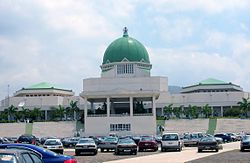House of Representatives | |
|---|---|
| 10th National Assembly | |
 | |
| Type | |
| Type | |
Term limits | None |
| History | |
New session started | 13 June 2023 |
| Leadership | |
Majority Leader | |
Minority Leader | |
Majority Whip | |
Minority Whip | |
| Structure | |
| Seats | 360 |
 | |
Political groups | Majority (242) Minority (72) Others (46) |
Length of term | 4 years |
| Elections | |
| First-past-the-post | |
Last election | 25 February 2023 |
Next election | 27 February 2027 |
| Meeting place | |
 | |
| National Assembly Complex Abuja, FCT, Nigeria | |
| Website | |
| www | |
 |
|---|
The House of Representatives (also called Green Chamber) is the lower chamber of Nigeria's bicameral National Assembly. [1] The Senate is the upper chamber. [2]
Contents
The Green Chamber has 360 members who are elected in single-member constituencies using the plurality (or first-past-the-post) system, most recently in 2023. Members serve four-year terms. The presiding officer of the house is the Speaker, currently Tajudden Abbas (as of May 2024).

